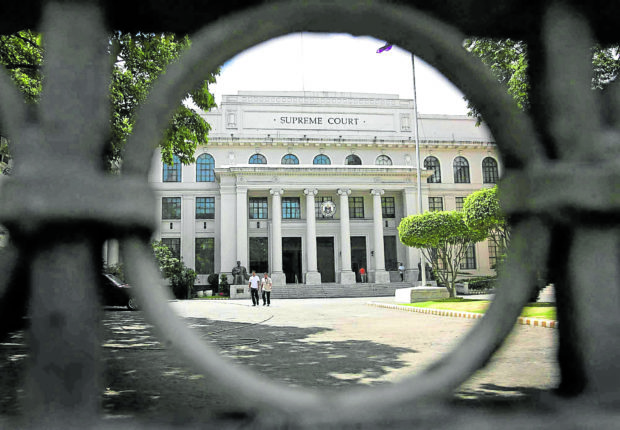
NEW LAW The Supreme Court building viewed from its closed gateway.—INQUIRER FILE PHOTO
Beginning Nov. 2, trial courts can impose the penalty of community service on those convicted of minor crimes punishable with imprisonment of six months or less after the Supreme Court announced the enforcement of Republic Act No. 11362, or the Community Service Act, that President Rodrigo Duterte signed on Aug. 8 last year.
The law gave the courts the discretion to order community service in lieu of imprisonment for those found guilty of minor offenses, and to set the terms of service.
However, a person may avail of community service as penalty only once.
Guidelines
The Supreme Court approved the guidelines of the implementation of the law during their weekly full court session on Oct. 6, its public information office said on Wednesday.
The guidelines, however, were not yet released.
The law defined community service as “any actual physical activity which inculcates civic consciousness, and intended toward the improvement of a public work or the promotion of a public service.”
According to the Supreme Court’s public information office, the judge shall give the convicted person the option to ask to render community service in the place where the crime was committed, in lieu of imprisonment of six months or less.
In the decision of the court requiring community service as penalty, the magistrate will have to specify the number of hours to be worked and the period within which to complete the service.
The court has to notify the local barangay officials, probation officers and social welfare officers and hold a hearing then decide within five days from the time of application whether to allow community service.
Considerations
A judge should consider “the gravity of offense, circumstances of the case, welfare of the society, and reasonable probability that the accused shall not violate the law while rendering the service,” the Supreme Court said.
The person rendering community service will be supervised by a probation officer.
If the defendant violates the terms of the community service, he or she will be rearrested and will serve the full term of the penalty “in jail, or in the house of the defendant as provided under Article 88.”